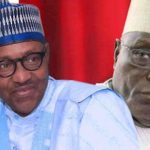The PDP and the Labour Party’s appeal contesting President Bola Tinubu’s election victory on February 25th was dismissed by the Supreme Court.
A seven-member panel today, Thursday headed by Justice Inyang Okoro dismissed the appeal for lack of merit in a unanimous decision.
Judge Inyang asserts that the data presented to the court proves President Tinubu’s victory in the election.

He added that the petitioner was not intended to be denigrated by the court of appeals.
In response to the PDP’s argument that the President did not win 21 of the 36 states, the court ruled that section 131(2) of the constitution is unambiguous, no alternative figure was presented to the court by the PDP, and the INEC results are therefore considered accurate.
Nonetheless, the court eliminated ten paragraphs from the PDP petition, stating that it was imprecise and devoid of specifics.
Justice Inyang added that it must be established in the petition requesting the annulment of an election due to noncompliance.
The appellant neglected to prove noncompliance in the court of appeals’ ruling.
They relied solely on INEC non-transmission of election results real-time
Failure of IREV does not stop the collection of results
The non functioning of IREV may have reduced the confidence of Nigerians in the electoral system.
The inaccessibility of election results on IREV cannot be used to invalidate an election.
The failure to send results to IREV had no effect on the election.
Concerning the FCT’s 25% vote share. The Court stated that the court of appeals’ decision on this issue was correct.
A narrow and selfish interpretation of the constitution should be avoided.
The constitution, according to Justice Inyang, is for everyone, not just a select few.
Therefore, the decision of the court of appeal in this issue is unassailable
Justice Inyang went on to say that the Supreme Court cannot invoke Section 22 of its act after the trial court’s deadline of 180 days has passed.
A petitioner may not amend its petition after the 21-day period for filing a petition has expired, according to section 134(7) of the electoral act, and nothing in section 285(6) of the constitution suggests that the court of appeals can hear election petitions without time limits.
The PDP’s position that the court of appeal is not covered by the 180-day term because it is not mentioned as a tribunal in the constitution is erroneous.
The Court in its ruling said the application filed by the PDP cannot be granted and the court cannot admit the deposition.
Justice Inyang said there is no issue for determination by the appellant that points on certificate forgery, hence fresh evidence is not received as a matter of cost.
The supreme court however dismissed PDP’s application to bring in fresh evidence including its appeal.
The PDP and the Labour Party’s appeal contesting President Bola Tinubu’s election victory on February 25th was dismissed by the Supreme Court.
A seven-member panel today, Thursday headed by Justice Inyang Okoro dismissed the appeal for lack of merit in a unanimous decision.
Judge Inyang asserts that the data presented to the court proves President Tinubu’s victory in the election.

He added that the petitioner was not intended to be denigrated by the court of appeals.
In response to the PDP’s argument that the President did not win 21 of the 36 states, the court ruled that section 131(2) of the constitution is unambiguous, no alternative figure was presented to the court by the PDP, and the INEC results are therefore considered accurate.
Nonetheless, the court eliminated ten paragraphs from the PDP petition, stating that it was imprecise and devoid of specifics.
Justice Inyang added that it must be established in the petition requesting the annulment of an election due to noncompliance.
The appellant neglected to prove noncompliance in the court of appeals’ ruling.
They relied solely on INEC non-transmission of election results real-time
Failure of IREV does not stop the collection of results
The non functioning of IREV may have reduced the confidence of Nigerians in the electoral system.
The inaccessibility of election results on IREV cannot be used to invalidate an election.
The failure to send results to IREV had no effect on the election.
Concerning the FCT’s 25% vote share. The Court stated that the court of appeals’ decision on this issue was correct.
A narrow and selfish interpretation of the constitution should be avoided.
The constitution, according to Justice Inyang, is for everyone, not just a select few.
Therefore, the decision of the court of appeal in this issue is unassailable
Justice Inyang went on to say that the Supreme Court cannot invoke Section 22 of its act after the trial court’s deadline of 180 days has passed.
A petitioner may not amend its petition after the 21-day period for filing a petition has expired, according to section 134(7) of the electoral act, and nothing in section 285(6) of the constitution suggests that the court of appeals can hear election petitions without time limits.
The PDP’s position that the court of appeal is not covered by the 180-day term because it is not mentioned as a tribunal in the constitution is erroneous.
The Court in its ruling said the application filed by the PDP cannot be granted and the court cannot admit the deposition.
Justice Inyang said there is no issue for determination by the appellant that points on certificate forgery, hence fresh evidence is not received as a matter of cost.
The supreme court however dismissed PDP’s application to bring in fresh evidence including its appeal.
The PDP and the Labour Party’s appeal contesting President Bola Tinubu’s election victory on February 25th was dismissed by the Supreme Court.
A seven-member panel today, Thursday headed by Justice Inyang Okoro dismissed the appeal for lack of merit in a unanimous decision.
Judge Inyang asserts that the data presented to the court proves President Tinubu’s victory in the election.

He added that the petitioner was not intended to be denigrated by the court of appeals.
In response to the PDP’s argument that the President did not win 21 of the 36 states, the court ruled that section 131(2) of the constitution is unambiguous, no alternative figure was presented to the court by the PDP, and the INEC results are therefore considered accurate.
Nonetheless, the court eliminated ten paragraphs from the PDP petition, stating that it was imprecise and devoid of specifics.
Justice Inyang added that it must be established in the petition requesting the annulment of an election due to noncompliance.
The appellant neglected to prove noncompliance in the court of appeals’ ruling.
They relied solely on INEC non-transmission of election results real-time
Failure of IREV does not stop the collection of results
The non functioning of IREV may have reduced the confidence of Nigerians in the electoral system.
The inaccessibility of election results on IREV cannot be used to invalidate an election.
The failure to send results to IREV had no effect on the election.
Concerning the FCT’s 25% vote share. The Court stated that the court of appeals’ decision on this issue was correct.
A narrow and selfish interpretation of the constitution should be avoided.
The constitution, according to Justice Inyang, is for everyone, not just a select few.
Therefore, the decision of the court of appeal in this issue is unassailable
Justice Inyang went on to say that the Supreme Court cannot invoke Section 22 of its act after the trial court’s deadline of 180 days has passed.
A petitioner may not amend its petition after the 21-day period for filing a petition has expired, according to section 134(7) of the electoral act, and nothing in section 285(6) of the constitution suggests that the court of appeals can hear election petitions without time limits.
The PDP’s position that the court of appeal is not covered by the 180-day term because it is not mentioned as a tribunal in the constitution is erroneous.
The Court in its ruling said the application filed by the PDP cannot be granted and the court cannot admit the deposition.
Justice Inyang said there is no issue for determination by the appellant that points on certificate forgery, hence fresh evidence is not received as a matter of cost.
The supreme court however dismissed PDP’s application to bring in fresh evidence including its appeal.
The PDP and the Labour Party’s appeal contesting President Bola Tinubu’s election victory on February 25th was dismissed by the Supreme Court.
A seven-member panel today, Thursday headed by Justice Inyang Okoro dismissed the appeal for lack of merit in a unanimous decision.
Judge Inyang asserts that the data presented to the court proves President Tinubu’s victory in the election.

He added that the petitioner was not intended to be denigrated by the court of appeals.
In response to the PDP’s argument that the President did not win 21 of the 36 states, the court ruled that section 131(2) of the constitution is unambiguous, no alternative figure was presented to the court by the PDP, and the INEC results are therefore considered accurate.
Nonetheless, the court eliminated ten paragraphs from the PDP petition, stating that it was imprecise and devoid of specifics.
Justice Inyang added that it must be established in the petition requesting the annulment of an election due to noncompliance.
The appellant neglected to prove noncompliance in the court of appeals’ ruling.
They relied solely on INEC non-transmission of election results real-time
Failure of IREV does not stop the collection of results
The non functioning of IREV may have reduced the confidence of Nigerians in the electoral system.
The inaccessibility of election results on IREV cannot be used to invalidate an election.
The failure to send results to IREV had no effect on the election.
Concerning the FCT’s 25% vote share. The Court stated that the court of appeals’ decision on this issue was correct.
A narrow and selfish interpretation of the constitution should be avoided.
The constitution, according to Justice Inyang, is for everyone, not just a select few.
Therefore, the decision of the court of appeal in this issue is unassailable
Justice Inyang went on to say that the Supreme Court cannot invoke Section 22 of its act after the trial court’s deadline of 180 days has passed.
A petitioner may not amend its petition after the 21-day period for filing a petition has expired, according to section 134(7) of the electoral act, and nothing in section 285(6) of the constitution suggests that the court of appeals can hear election petitions without time limits.
The PDP’s position that the court of appeal is not covered by the 180-day term because it is not mentioned as a tribunal in the constitution is erroneous.
The Court in its ruling said the application filed by the PDP cannot be granted and the court cannot admit the deposition.
Justice Inyang said there is no issue for determination by the appellant that points on certificate forgery, hence fresh evidence is not received as a matter of cost.
The supreme court however dismissed PDP’s application to bring in fresh evidence including its appeal.
The PDP and the Labour Party’s appeal contesting President Bola Tinubu’s election victory on February 25th was dismissed by the Supreme Court.
A seven-member panel today, Thursday headed by Justice Inyang Okoro dismissed the appeal for lack of merit in a unanimous decision.
Judge Inyang asserts that the data presented to the court proves President Tinubu’s victory in the election.

He added that the petitioner was not intended to be denigrated by the court of appeals.
In response to the PDP’s argument that the President did not win 21 of the 36 states, the court ruled that section 131(2) of the constitution is unambiguous, no alternative figure was presented to the court by the PDP, and the INEC results are therefore considered accurate.
Nonetheless, the court eliminated ten paragraphs from the PDP petition, stating that it was imprecise and devoid of specifics.
Justice Inyang added that it must be established in the petition requesting the annulment of an election due to noncompliance.
The appellant neglected to prove noncompliance in the court of appeals’ ruling.
They relied solely on INEC non-transmission of election results real-time
Failure of IREV does not stop the collection of results
The non functioning of IREV may have reduced the confidence of Nigerians in the electoral system.
The inaccessibility of election results on IREV cannot be used to invalidate an election.
The failure to send results to IREV had no effect on the election.
Concerning the FCT’s 25% vote share. The Court stated that the court of appeals’ decision on this issue was correct.
A narrow and selfish interpretation of the constitution should be avoided.
The constitution, according to Justice Inyang, is for everyone, not just a select few.
Therefore, the decision of the court of appeal in this issue is unassailable
Justice Inyang went on to say that the Supreme Court cannot invoke Section 22 of its act after the trial court’s deadline of 180 days has passed.
A petitioner may not amend its petition after the 21-day period for filing a petition has expired, according to section 134(7) of the electoral act, and nothing in section 285(6) of the constitution suggests that the court of appeals can hear election petitions without time limits.
The PDP’s position that the court of appeal is not covered by the 180-day term because it is not mentioned as a tribunal in the constitution is erroneous.
The Court in its ruling said the application filed by the PDP cannot be granted and the court cannot admit the deposition.
Justice Inyang said there is no issue for determination by the appellant that points on certificate forgery, hence fresh evidence is not received as a matter of cost.
The supreme court however dismissed PDP’s application to bring in fresh evidence including its appeal.
The PDP and the Labour Party’s appeal contesting President Bola Tinubu’s election victory on February 25th was dismissed by the Supreme Court.
A seven-member panel today, Thursday headed by Justice Inyang Okoro dismissed the appeal for lack of merit in a unanimous decision.
Judge Inyang asserts that the data presented to the court proves President Tinubu’s victory in the election.

He added that the petitioner was not intended to be denigrated by the court of appeals.
In response to the PDP’s argument that the President did not win 21 of the 36 states, the court ruled that section 131(2) of the constitution is unambiguous, no alternative figure was presented to the court by the PDP, and the INEC results are therefore considered accurate.
Nonetheless, the court eliminated ten paragraphs from the PDP petition, stating that it was imprecise and devoid of specifics.
Justice Inyang added that it must be established in the petition requesting the annulment of an election due to noncompliance.
The appellant neglected to prove noncompliance in the court of appeals’ ruling.
They relied solely on INEC non-transmission of election results real-time
Failure of IREV does not stop the collection of results
The non functioning of IREV may have reduced the confidence of Nigerians in the electoral system.
The inaccessibility of election results on IREV cannot be used to invalidate an election.
The failure to send results to IREV had no effect on the election.
Concerning the FCT’s 25% vote share. The Court stated that the court of appeals’ decision on this issue was correct.
A narrow and selfish interpretation of the constitution should be avoided.
The constitution, according to Justice Inyang, is for everyone, not just a select few.
Therefore, the decision of the court of appeal in this issue is unassailable
Justice Inyang went on to say that the Supreme Court cannot invoke Section 22 of its act after the trial court’s deadline of 180 days has passed.
A petitioner may not amend its petition after the 21-day period for filing a petition has expired, according to section 134(7) of the electoral act, and nothing in section 285(6) of the constitution suggests that the court of appeals can hear election petitions without time limits.
The PDP’s position that the court of appeal is not covered by the 180-day term because it is not mentioned as a tribunal in the constitution is erroneous.
The Court in its ruling said the application filed by the PDP cannot be granted and the court cannot admit the deposition.
Justice Inyang said there is no issue for determination by the appellant that points on certificate forgery, hence fresh evidence is not received as a matter of cost.
The supreme court however dismissed PDP’s application to bring in fresh evidence including its appeal.
The PDP and the Labour Party’s appeal contesting President Bola Tinubu’s election victory on February 25th was dismissed by the Supreme Court.
A seven-member panel today, Thursday headed by Justice Inyang Okoro dismissed the appeal for lack of merit in a unanimous decision.
Judge Inyang asserts that the data presented to the court proves President Tinubu’s victory in the election.

He added that the petitioner was not intended to be denigrated by the court of appeals.
In response to the PDP’s argument that the President did not win 21 of the 36 states, the court ruled that section 131(2) of the constitution is unambiguous, no alternative figure was presented to the court by the PDP, and the INEC results are therefore considered accurate.
Nonetheless, the court eliminated ten paragraphs from the PDP petition, stating that it was imprecise and devoid of specifics.
Justice Inyang added that it must be established in the petition requesting the annulment of an election due to noncompliance.
The appellant neglected to prove noncompliance in the court of appeals’ ruling.
They relied solely on INEC non-transmission of election results real-time
Failure of IREV does not stop the collection of results
The non functioning of IREV may have reduced the confidence of Nigerians in the electoral system.
The inaccessibility of election results on IREV cannot be used to invalidate an election.
The failure to send results to IREV had no effect on the election.
Concerning the FCT’s 25% vote share. The Court stated that the court of appeals’ decision on this issue was correct.
A narrow and selfish interpretation of the constitution should be avoided.
The constitution, according to Justice Inyang, is for everyone, not just a select few.
Therefore, the decision of the court of appeal in this issue is unassailable
Justice Inyang went on to say that the Supreme Court cannot invoke Section 22 of its act after the trial court’s deadline of 180 days has passed.
A petitioner may not amend its petition after the 21-day period for filing a petition has expired, according to section 134(7) of the electoral act, and nothing in section 285(6) of the constitution suggests that the court of appeals can hear election petitions without time limits.
The PDP’s position that the court of appeal is not covered by the 180-day term because it is not mentioned as a tribunal in the constitution is erroneous.
The Court in its ruling said the application filed by the PDP cannot be granted and the court cannot admit the deposition.
Justice Inyang said there is no issue for determination by the appellant that points on certificate forgery, hence fresh evidence is not received as a matter of cost.
The supreme court however dismissed PDP’s application to bring in fresh evidence including its appeal.
The PDP and the Labour Party’s appeal contesting President Bola Tinubu’s election victory on February 25th was dismissed by the Supreme Court.
A seven-member panel today, Thursday headed by Justice Inyang Okoro dismissed the appeal for lack of merit in a unanimous decision.
Judge Inyang asserts that the data presented to the court proves President Tinubu’s victory in the election.

He added that the petitioner was not intended to be denigrated by the court of appeals.
In response to the PDP’s argument that the President did not win 21 of the 36 states, the court ruled that section 131(2) of the constitution is unambiguous, no alternative figure was presented to the court by the PDP, and the INEC results are therefore considered accurate.
Nonetheless, the court eliminated ten paragraphs from the PDP petition, stating that it was imprecise and devoid of specifics.
Justice Inyang added that it must be established in the petition requesting the annulment of an election due to noncompliance.
The appellant neglected to prove noncompliance in the court of appeals’ ruling.
They relied solely on INEC non-transmission of election results real-time
Failure of IREV does not stop the collection of results
The non functioning of IREV may have reduced the confidence of Nigerians in the electoral system.
The inaccessibility of election results on IREV cannot be used to invalidate an election.
The failure to send results to IREV had no effect on the election.
Concerning the FCT’s 25% vote share. The Court stated that the court of appeals’ decision on this issue was correct.
A narrow and selfish interpretation of the constitution should be avoided.
The constitution, according to Justice Inyang, is for everyone, not just a select few.
Therefore, the decision of the court of appeal in this issue is unassailable
Justice Inyang went on to say that the Supreme Court cannot invoke Section 22 of its act after the trial court’s deadline of 180 days has passed.
A petitioner may not amend its petition after the 21-day period for filing a petition has expired, according to section 134(7) of the electoral act, and nothing in section 285(6) of the constitution suggests that the court of appeals can hear election petitions without time limits.
The PDP’s position that the court of appeal is not covered by the 180-day term because it is not mentioned as a tribunal in the constitution is erroneous.
The Court in its ruling said the application filed by the PDP cannot be granted and the court cannot admit the deposition.
Justice Inyang said there is no issue for determination by the appellant that points on certificate forgery, hence fresh evidence is not received as a matter of cost.
The supreme court however dismissed PDP’s application to bring in fresh evidence including its appeal.














